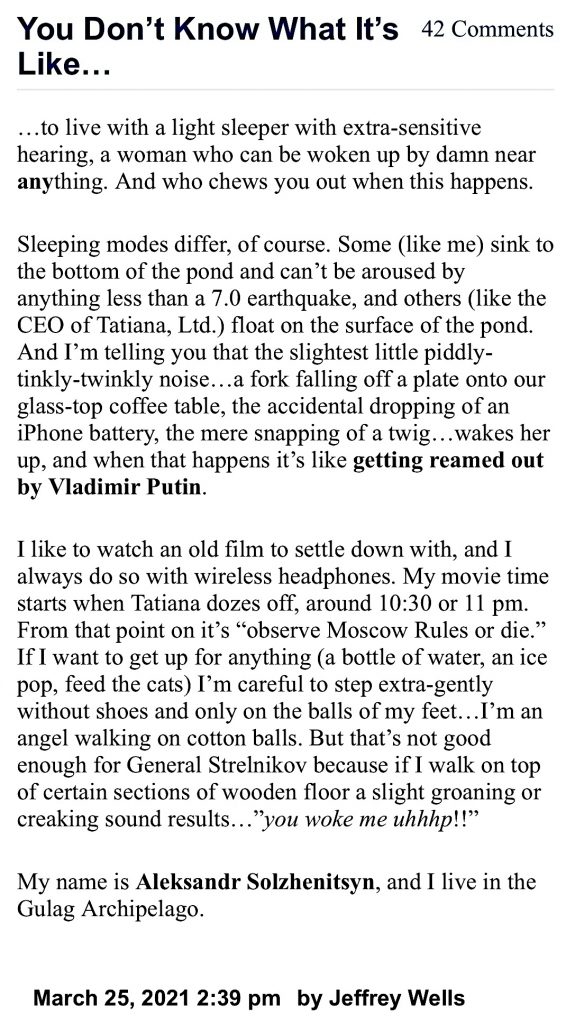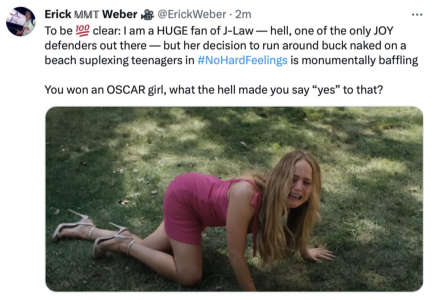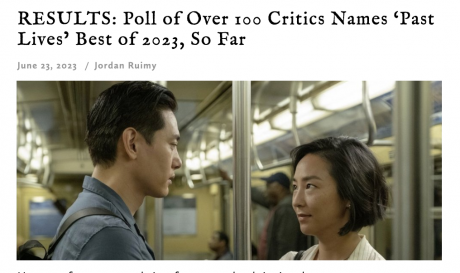Or: the pitfalls of cohabitation with Major General Dimitri Strelnikov in the early spring of ‘21.

Or: the pitfalls of cohabitation with Major General Dimitri Strelnikov in the early spring of ‘21.

I’d never heard of the New Plaza Cinema (35 West 67th Street, New York, NY 10023) but that’s where I’ll be catching The Night of the 12th tomorrow night at 7 pm. A recently opened and much-admired French policier, set in Grenoble, about a case that won’t (can’t>) be solved.
No Hard Feeings (Sony, currently playing) is a casually coarse sex comedy about an “inappropriate age gap” relationship between Maddie (Jennifer Lawrence), a 32 year-old Montauk bartender in a financial hole, and Percy (Andrew Barth Feldman), an introverted 19-year-old who’s about to become a Princeton freshman.
Percy’s helicopter parents (Matthew Broderick, Laura Benanti) are concerned about his lack of outgoingness plus the fact that he’s still a virgin, so they place an ad in Craigslist that says “looking for a 20something woman who can pull our son out of his shell” — the implication being that they want this woman to sexually initiate the lad and generally prepare him for the social pressures of college.
Except the initial Craig’s List ad is way too explicit and detailed for an ad written by helicopter parents who want the whole thing kept on the down low — they don’t want their son to have so much as an inkling that they’re looking to hire a sexual tutor, etc. So right away it’s not believable.
If JLaw’s Maddie wanted to successfully seduce this kid, she might have taken a moment to size him up and determine if he’s the kind of raunchy-minded, ready-to-fuck kid who would playfully respond to “may I hold your Weiner?” or whatever the hell she says to him in the pet store.
Percy is a quiet, soulful type with a subdued sex drive — that’s obvious from the get-go. He’s congealed and too inwardly directed, but he’s not stupid. If I were in his shoes (I didn’t get lucky for the first time until I was 19) I would be immediately suspicious as to why this 30ish woman is so behaving so aggressively, like Gwen Verdon’s “Lola” behaves with Tab Hunter when she performs “Whatever Lola Wants” in Damn Yankees.
And JLaws’s “full frontal nudity” looks digitally muddy — it’s not real on some level, though I’m unsure in which way. Portions of her bod appear to have been “washed” in some way. And why don’t we see a moonlit shot of her running into the surf from Percy’s point of view (hence no shot of her ass)? For an allegedly bawdy movie you naturally expect to see this shot, but they don’t show it. I may be wrong but I don’t think so.
Here’s my 6.18.23 review

Proceeding on the assumption that you can’t go wrong by praising a gentle, understated emotional film by a female South Korean director-writer (i.e., the general rule being to always tip toward (a) non-white ethnicity or (b) anything gay or trans), a plurality of critics have chosen Celine Song‘s Past Lives as the best film of 2023, according to a 6.23 poll from World of Reel‘s Jordan Ruimy.
In HE’s best of ’23 roster, Past Lives is ranked tenth. It’s a fine, sensitive, Brief Encounter-type love story but calm down. It’s all about subtext, impossible distances, zero physical contact, impossible social constraints and quietly pleading, gently leaking expressions. And forget John Magaro as a Best Supporting Actor contender.

The other faves in Ruimy’s poll (and in this order): Spider-Man: Across the Spider-Verse, Air, John Wick: Chapter 4 (WHAT??), Asteroid City (whores), Blackberry (approved), R.M.N. (approved), Showing Up, Beau is Afraid (approved), Pacification (who?), You Hurt My Feelings (not bad), Tori & Lokita (decent film but critics are always obliged to bow down to the Dardennes), De Humani Corporis Fabrica, How to Blow Up A Pipeline, The Eight Mountains, Guardians of the Galaxy Vol. 3, Are You There God, It’s Me Margaret, Dungeons and Dragons, Me3gan, Infinity Pool.
HE’s top 2023 films (posted on 6.22.23):
1. Tran Anh Hung’s The Pot au Feu
2. Guy Ritchie‘s The Covenant
3. Christian Mungiu‘s R.M.N.
4. Eric Gravel‘s Full Time
5. Jonathan Glazer‘s The Zone of Interest
6. Martin Scorsese‘s Killers of the Flower Moon
7. Matt Johnson‘s Blackberry
8. Ari Aster‘s Beau Is Afraid
9. Ben Affleck‘s Air
10. Celine Song‘s Past Lives
11. Jean-Stephen Sauvaire’s Black Flies.
12. Steven Soderbergh‘s Magic Mike’s Last Dance
Ethan Coen‘s Drive Away Dolls (Focus Features, 9.22) seems like a harmlessly broad innocents-in-jeopardy road comedy. Innocent lesbians, that is, which Ethan had to commit to, given the times and the culture. The only alternate option would have been to focus on a gay or trans couple. The original title was Drive Away Dykes.
It seem like an apparent riff on a No Country-like chase plot among some dumbshit lower-class types, written and performed in the usual deadpan Coen style.
A youngish couple inclined toward despair and glumness (Margaret Qualley with a yokel accent + Geraldine Viswanathan, a good actress with a last name that no one will be able to spell much less pronounce) accidentally get hold of a MacGuffin suitcase (money, drugs, whatevs) and it’s off to the races.
The rotund Beanie Feldstein is the sardonic cop (i.e., a philosophical perspective stand-in for Tommy Lee Jones?) who’s keeping tabs, following the situation. The mere presence of Pedro Pascal, who has a significant role in just about every damn film being made or released these days, is driving me crazy. Further deadpan humor from Colman Domingo, Bill Camp, Matt Damon, etc.
James Cameron didn’t fuck around during his chat with CNN’s Anderson Cooper.
“The guys at OceanGate” (particularly CEO Stockton Rush, who died on 6.18 along with the other four passengers) “didn’t remember the lesson of the Titanic,” he said, and that “the arrogance and the hubris” that doomed Titanic is exactly what doomed the Titan five days ago and actually long before that.
No sugar-coating or pussy-footing — the accountability for this tragic accident is on Rush.
Cameron had not only been confidentially persuaded but knew “in his bones” last Monday, he says, that the Titan had almost certainly experienced a catastrophic implosion. He stayed silent while strongly suspecting that the truth would eventually come out.
Cameron didn’t address this, but the likelihood of the bodies of the five Titan passengers being recovered is almost certainly nil. Concern for the families of the deceased is presently discouraging anyone from acknowledging that the term “bodies” is probablv inapplicable in this situation.
The people who knew (or had been confidentially told by trusted sources) what had almost certainly happened apparently decided en masse to commit to a kind of spiritual narrative or theatrical passion play based on hope — a less than 1% chance that the Titan might still be intact and that the five men might still be alive and perhaps stranded on the ocean floor. They all decided to “play along” as an emotional gesture to the families. Nobody wanted to sound heartless by acknowledging the likelihood that the five men were almost certainly dead and most likely fish food. It was decided that maintaining a kind of hope vigil was the more humane and compassionate way to go.
1. Tran Anh Hung’s The Pot au Feu
2. Guy Ritchie‘s The Covenant
3. Christian Mungiu‘s RMN
4. Eric Gravel‘s Full Time
5. Jonathan Glazer‘s The Zone of Interest
6. Martin Scorsese‘s Killers of the Flower Moon
7. Matt Johnson‘s Blackberry
8. Ari Aster‘s Beau Is Afraid
9. Ben Affleck‘s Air
10. Celine Song‘s Past Lives
11. Jean-Stephen Sauvaire’s Black Flies.
12. Steven Soderbergh‘s Magic Mike’s Last Dance

Okay, this one has my interest — The Social Network meets The Big Short meets a roomful of GameStop dorks. Paul Dano as Keith Gill, a financial analyst and investor known for his posts on the subreddit r/wallstreetbets.
Wiki summary: “Gill’s analyses of GameStop stock, and details of his resulting investment gains, posted on Reddit under the username DeepFuckingValue (DFV) and on YouTube and Twitter as Roaring Kitty — were cited as a driving factor in the GameStop short squeeze of January 2021, and as a spark for the subsequent trading frenzy in retail stocks. The rising stock value allowed Gill to turn a $53,000 investment into one worth close to $50 million (as of 1.28.21).”
Costarring Pete Davidson, Shailene Woodley, Vincent D’Onofrio, America Ferrera, Nick Offerman, Anthony Ramos, Sebastian Stan and Seth Rogen. Based on Ben Mezrich‘s “The Antisocial Network” and directed by Craig Gillespie (I, Tonya, Cruella, Pam & Tommy). Opening in theatres on 9.22.23.
Here’s a day-old statement from Steven Spielberg, Martin Scorsese and Paul Thomas Anderson about (a) the sudden, savage whacking of several Turner Classic Movies execs, and (b) the three directors’ subsequent discussions with Warner Bros. Discovery honcho David Zaslav:
“Turner Classic Movies has always been more than just a channel. It is truly a precious resource of cinema, open 24 hours a day seven days a week. And while it has never been a financial juggernaut, it has always been a profitable endeavor since its inception.
“Earlier this week, David Zaslav, the CEO of Warner Bros. Discovery, got in touch to talk about the restructuring of TCM. We understand the pressures and realities of a corporation as large as WBD, of which TCM is one moving part.
“We have each spent time talking to David, separately and together, and it’s clear that TCM and classic cinema are very important to him. Our primary aim is to ensure that TCM’s programming is untouched and protected.
“We are heartened and encouraged by the conversations we’ve had thus far, and we are committed to working together to ensure the continuation of this cultural touchstone that we all treasure.”
HE translation: “We are heartened by Zaslav’s statements to us about protecting TCM and ensuring its continuance, as well as respecting its valuable cultural importance for the film community.
“At the same time we regret that Zaslav has decided to decimate the creative and managerial team behind TCM — TCM’s general manager Pola Chagnon, TCM’s senior vice president of programming and content strategy Charles Tabesh, vice president of studio production Anne Wilson, vice president of marketing and creative Dexter Fedor and TCM Enterprises vice president Genevieve McGillicuddy — all of them whacked like Joe Pesci in Goodfellas.
“TCM will henceforth be a different operation with a different personality. Are we happy about this? Not actually, no but…well, we don’t what to think or do, to be perfectly honest. It’s probably better to not to squawk too loudly and hope for the best.”
James Cameron to ABC News, posted this morning: “People in the community were very concerned about this sub. A number of the top players in the in the deep submergence engineering community even wrote letters to the company, saying that what they were doing was too experimental to carry passengers and that it needed to be certified. [For] deep-sea diving is a mature art…warnings went unheeded.
“I’m struck by the similarity of the Titanic disaster itself, where the captain was repeatedly warned about ice ahead of his ship, and yet he steamed at full speed into an ice field on a moonless night and many people died as a result. For us, it’s a very similar tragedy where warnings went unheeded. To take place at the same exact site with all the diving that’s going on all around the world, I think it’s just astonishing…it’s really quite surreal.”
Stockton Rush is the Bruce Ismay figure here. His actions in this tragedy will forever be regarded as a huge “what the hell was he thinking?”…an unforgettable cautionary tale.
Cameron on the potential pitfalls of a carbon fibre hull, as expressed decades ago: “I told these guys, somebody’s gonna get killed.”
Start to finish, No Country For Old Men is filled with scenes of this calibre. Perfectly shaped and performed….exactly right, triple or quadruple spot-on.
And now their souls have been psychedelicized or, you know, cosmically fulfilled in some perfect way.
Life is an endless valley of pain, struggle, boredom and torment, broken up by little moments (occasional, relatively brief) of peace, chuckles, solace and euphoria. All of that is now over for the five men whose lives ended a few days ago aboard the Titan. There is, at least, that finality. All things come to an end. Every last living thing on this planet (myself included) will face such a moment.
Are the five bodies recoverable? The depth where they died — nearly 12,000 feet down — is “a very unforgiving environment,” a Coast Guard spokesperson has just said. The bodies were certainly subjected to a sudden and intense increase in pressure so use your imagination. I’m very sorry but at least it was quick.
Stockton Rush, the founder and chief executive of OceanGate Expeditions, the company that operated the submersible, is the principal bad guy here. There’s no other rational conclusion.